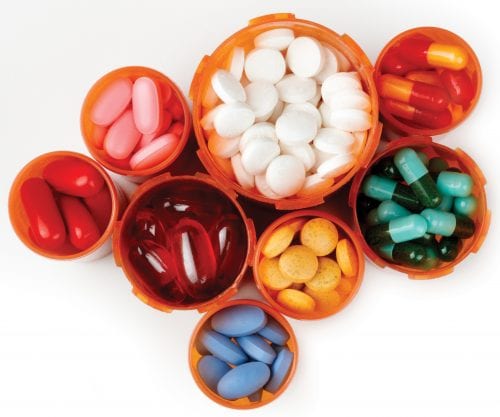
Eating right and exercising but struggling to lose weight? Your medication may be at fault. Philippa Sandall helps you spot the suspects and gives you simple, effective strategies.
Okay, you’ve got some health issues, and your doctor has told you what you already knew: you need to lose a little weight and move more. So you joined the gym, and you actually work out twice a week. You’re also eating more fruit and veg, and have virtually cut out snacks. So what’s up with the numbers on the scales?
Shedding a few kilos is often a priority for those of us who have a chronic disease. People with type 2 diabetes, for example, are better able to manage their blood-glucose levels if they lose around five per cent of their body weight because this reduces their risk of complications, as well as cardiovascular disease, down the track. Arthritis sufferers who carry less weight lighten the load on their joints, easing constant pain, and weight loss can also help people with hypertension lower their blood pressure.
The problem is that some prescription medicines for these long-term diseases can trigger weight gain, or thwart weight-loss efforts. On top of this, some depression and epilepsy drugs can also lead to unwanted kilos, as can certain antihistamines, which include some over-the-counter products.
Spot the side effects
So why do certain prescription medicines lead to kilo creep, or make it hard to lose weight?
“It’s usually the side effects,” says US pharmacist Ted Kyle, Chair of the Obesity Action Coalition. “Some drugs stimulate your appetite; other drugs can affect the way your body absorbs and stores glucose, which can lead to fat deposits in your midsection. Still others cause you to retain water, which adds weight but not fat. Some drugs slow kilojoule burn by changing your body’s metabolism; others can cause shortness of breath and fatigue, making it difficult to exercise.
“The amount of weight varies from person to person and from drug to drug – some people may gain a couple of kilos over the course of a year, whereas others can gain five to 10 (or more) kilos in just a few months.”
According to endocrinologist Tania Markovic, Director of Metabolism and Obesity Services at Sydney’s Royal Prince Alfred Hospital, most doctors are aware of which medications result in weight gain. “Whenever possible, they’ll prescribe an alternative drug to treat the condition without causing weight gain or making it harder to lose excess weight.”
Pinpoint the problem
Still stuck on a weight plateau despite your best efforts to eat a better diet and be more active? Even if you think your prescription medicine is causing weight gain or preventing weight loss, don’t stop taking it – this could have serious consequences.
- Find out if weight gain is a potential side effect of your medication. Prescription drugs usually come with a data sheet that lists all possible side effects. Check the leaflet or ask your pharmacist. You can also find medicine data sheets with this information at medsafe.govt.nz.
- Collect some data for your doctor. Keep a food and exercise diary tracking what and when you eat, your exercise routine, and record your weight for a few weeks, using the same scales each time to maintain consistency. Make a note of any particularly stressful events in your life, and note how well you’re sleeping. This information will paint a picture that helps the doctor review your situation.
- Make an appointment with your doctor to find out what’s behind your weight gain and to design a solution that works for you. If the medication is at fault, your doctor may be able to switch it for a drug that has no effect on your weight or can even help you lose weight. If no appropriate alternative is available, your doctor has many options, such as changing the dose or the time of day you take your medicine, or even coming up with a different mix of meds.
- If prescription meds are hindering your weight-loss efforts, and your doctor cannot prescribe an alternative drug, ask for a referral to a dietitian or a nutritionist. If you have private health insurance, you may be able to claim a certain number of consultations.
Hungry all the time?
“In our clinic, people mainly report an increase in appetite – many feel hungry all the time,” says endocrinologist Markovic. She says that telling people to eat less and exercise more is simply unhelpful. Instead she encourages patients to eat fewer energy-dense foods (high-kilojoule), and more foods that are not particularly energy-dense but full of nutrients, such as plenty of fruit, veges and other foods with a high water content.
“They should also look for low-GI carbohydrates and lean protein-rich foods to keep them feeling full for longer. Foods to avoid include fatty meats such as lamb chops, sausages and meat pies, along with pizzas, battered and deep-fried foods, cakes, confectionery and so on.”
Make the most of your meals
Volumetrics is a concept invented by US Professor of Nutrition Dr Barbara Rolls. It involves piling your plate with foods that are full of water and therefore low in kilojoules, such as non-starchy veges.
Rolls and her colleagues have conducted numerous studies which show that eating a low-kilojoule vegetable soup or salad at the start of a meal as a ‘preload’ can significantly reduce your energy intake of the total meal.
“This is a useful approach to creating healthy, filling meals throughout the day,” says Alan Barclay, PhD. “A relatively large and rapidly growing body of evidence demonstrates that certain kinds of foods help you feel full for longer – and by staving off unwanted hunger pangs, they help you consume less food and kilojoules.”
Three ways to make meals more satisfying
Dampen drug-related hunger pangs with these simple strategies.
1. Choose the right foods
When hunger hits, you want meals with lots of mileage. Opt for foods that provide low-GI carbohydrates, which the body digests more slowly, and fibre, which adds satisfying bulk to meals for few kilojoules.
- Most fruits (except melons)
- Some starchy vegetables: Pumpkin, corn, peas, carrots, parsnips
- Legumes: Chickpeas, beans, lentils, split peas
- Quality breads: Dense breads with whole grains and seeds, authentic sourdough breads
- Some breakfast cereals: Those that are high in bran and with minimally-refined oats
- Cereal grains: Pearl barley, some varieties of basmati rice, bulgar, buckwheat, noodles, pasta, pearl couscous, quinoa
- Dairy foods: Milk, yoghurt and dairy alternatives, such as soy milk
“When you combine these foods with quality high-protein foods, such as fish, poultry, meat, eggs, dairy products, nuts, seeds and legumes – as most traditional cuisines do – the resulting meals provide even greater sustenance and satisfaction,” explains Barclay.
2. Soup up your menu
Warm soup satisfies – it’s filling comfort food. Use good-quality chicken or vegetable stock to make your own soup, and freeze leftovers in single-serve portions.
If you like creamy soups, add a handful of lentils to the pot. When the vegetables are cooked, use a stick blender to blitz them into a deliciously smooth soup.
To add flavour and texture, top soups with plain yoghurt and chopped fresh herbs. Hold the cream, coconut milk and coconut cream – these extras are best saved for occasional treats.
These simple soups are full of nutritional goodies and loads of flavour that will hit the spot:
- Tomato and red lentil
- Spicy roast capsicum
- Thai-style pumpkin
- Broccoli and cauliflower
- Carrot, pumpkin and chives
- Chicken and corn
- Chilli black bean and veges
- Leek, potato and watercress
3. Plate up the right portions
The healthy portion plate is a simple visual guide to serving your food in the right proportions. This lets you enjoy ample amounts of nutritious, fibre-rich veges, which boost energy and help you feel full.
- Low-GI carbohydrates: 1/4 of your plate
- Protein-rich foods: 1/4 of your plate
- Low-energy vegetables: 1/2 of your plate
Drugs that can trigger weight gain
People react differently to drugs, so drawing up a definitive list of prescription meds that cause weight gain is complicated. Not everyone on a particular drug gains weight; some may even lose weight on it. Still, here are the common culprits:
- Oral steroids (corticosteroids), such as prednisone, for treating rheumatoid arthritis
- Beta blockers, for treating high blood pressure
- Lithium and tricyclics, for treating mood disorders, such as depression
- Insulin, sulfonylureas (SUs) and glitinides, among other meds that trigger the release of insulin (insulin secretagogues), for treating diabetes
- Anticonvulsants, such as valproic acid, for treating epilepsy and other neurological conditions, including migraine
Be proactive. When your doctor prescribes a new medication, ask about its potential side effects, including weight gain.
What about the pill?
Many women think that weight gain is a side effect of the pill, but the link is unproven. Some report they gain weight on the pill, whereas others say they lose it.
Over the past 50 years, countless studies of birth control methods have shown no significant weight variations among women using either hormonal contraceptives (such as the pill, a patch or a ring), or non-hormonal methods (such as an intrauterine device, or IUD).
According to the Cochrane Library – a set of databases that summarises all the evidence collected on any health topic – recent reviews on the effects of the pill and patches on weight have failed to show that contraceptives cause weight gain. However, this doesn’t rule out the possibility that some women will gain weight on these meds, say researchers. The birth-control shot depo-provera can cause weight gain, so the drug’s information leaflet lists ‘weight changes’ as a possible side effect.
If you’re already having trouble managing your weight, ask your doctor about contraceptive options that don’t lead to weight gain or are very unlikely to do so.
Weight won’t shift?
If you’ve tried the above tactics but are still battling the bulge, make an appointment to see your doctor. He or she knows your medical history and is therefore likely to spot any suspect genetic or lifestyle factors that may be hampering your weight-loss efforts.
Article sources and references
- Apovian CM et al. 2015. Pharmacological management of obesity: An Endocrine Society clinical practice guideline. Journal of Clinical Endocrinology & Metabolism 100:342–62https://www.ncbi.nlm.nih.gov/pubmed/25590212
- Gallo MF et al. 2014. Combination contraceptives: Effects on weight. Cochrane Library www.cochranelibrary.comhttps://www.cochranelibrary.com/cdsr/doi/10.1002/14651858.CD003987.pub5/full
- Kyle T & Kuehl B. 2014. Prescription medications and weight gain — what you need to know. www.obesityaction.org Accessed April 2015 Lopez et al. 2013. Progestin-only contraceptives: effects on weight. Cochrane Library www.cochranelibrary.comhttps://www.obesityaction.org/
www.healthyfood.com










